Taxation Law: Our Earth Pty Ltd - Tax Implications Analysis
VerifiedAdded on 2022/12/20
|12
|3942
|79
Homework Assignment
AI Summary
This assignment analyzes the tax implications for Our Earth Pty Ltd, focusing on compensation received due to design patent infringement and lost revenue. The solution addresses the tax consequences of various transactions, including damages for patent infringement, expected lost revenue, interest on damages, and reimbursement of legal fees. It applies relevant tax laws and case precedents, such as the Income Tax Assessment Act 1997 (ITAA 97), Shord v Commissioner of Taxation, Futuris Corporation Limited v Commissioner of Taxation, Commissioner of Taxation v Ashwick (Qld) No 127 Pty Ltd, Federal Commissioner of Taxation v Northumberland Development Co Pty Ltd, and Orica Limited v Commissioner of Taxation, to determine whether the compensation and other receipts should be treated as ordinary income or capital gains. The analysis concludes that the damages for patent infringement are taxed as capital gains, while lost revenue, interest, and reimbursement of legal fees are treated as ordinary income.
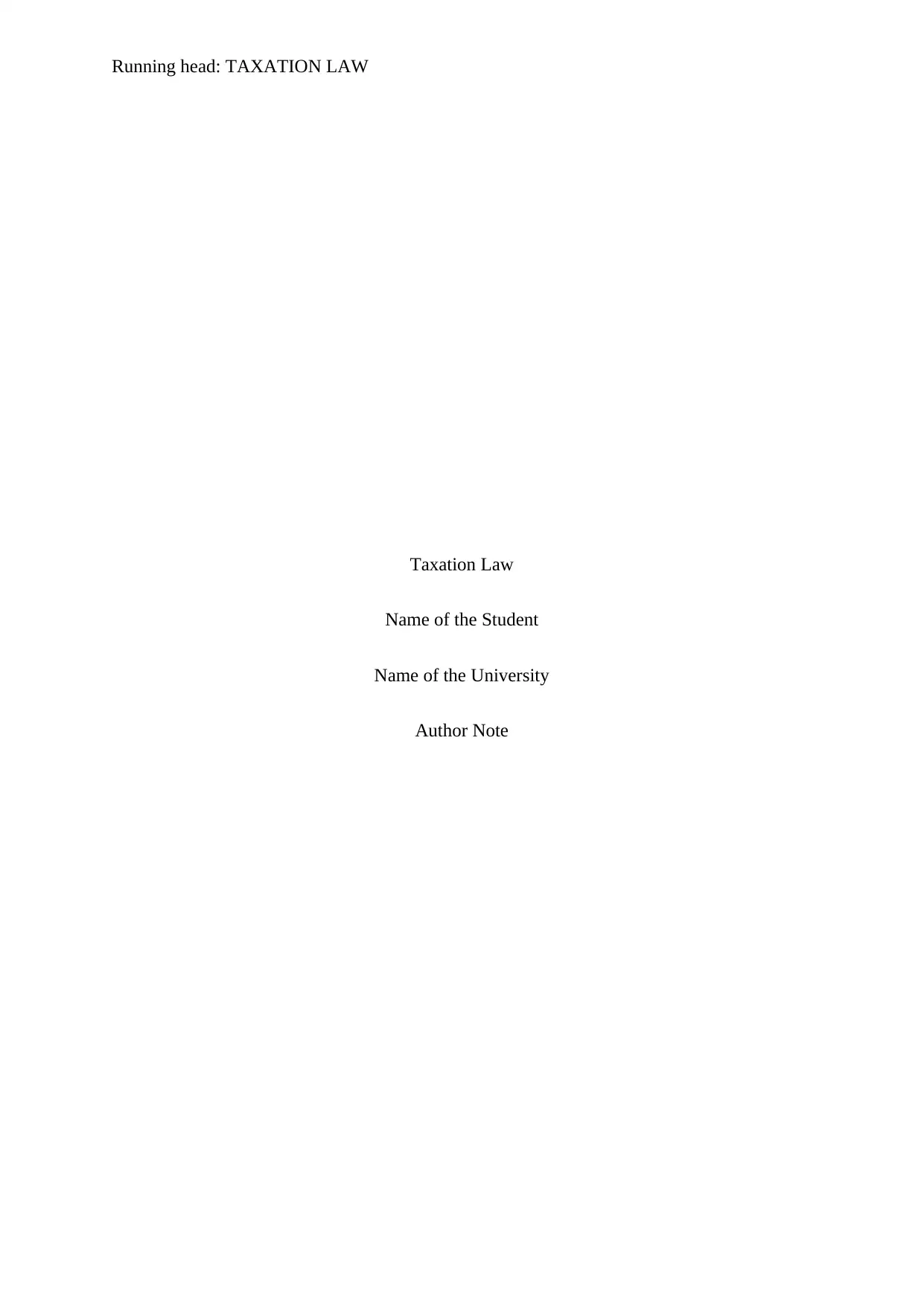
Running head: TAXATION LAW
Taxation Law
Name of the Student
Name of the University
Author Note
Taxation Law
Name of the Student
Name of the University
Author Note
Paraphrase This Document
Need a fresh take? Get an instant paraphrase of this document with our AI Paraphraser
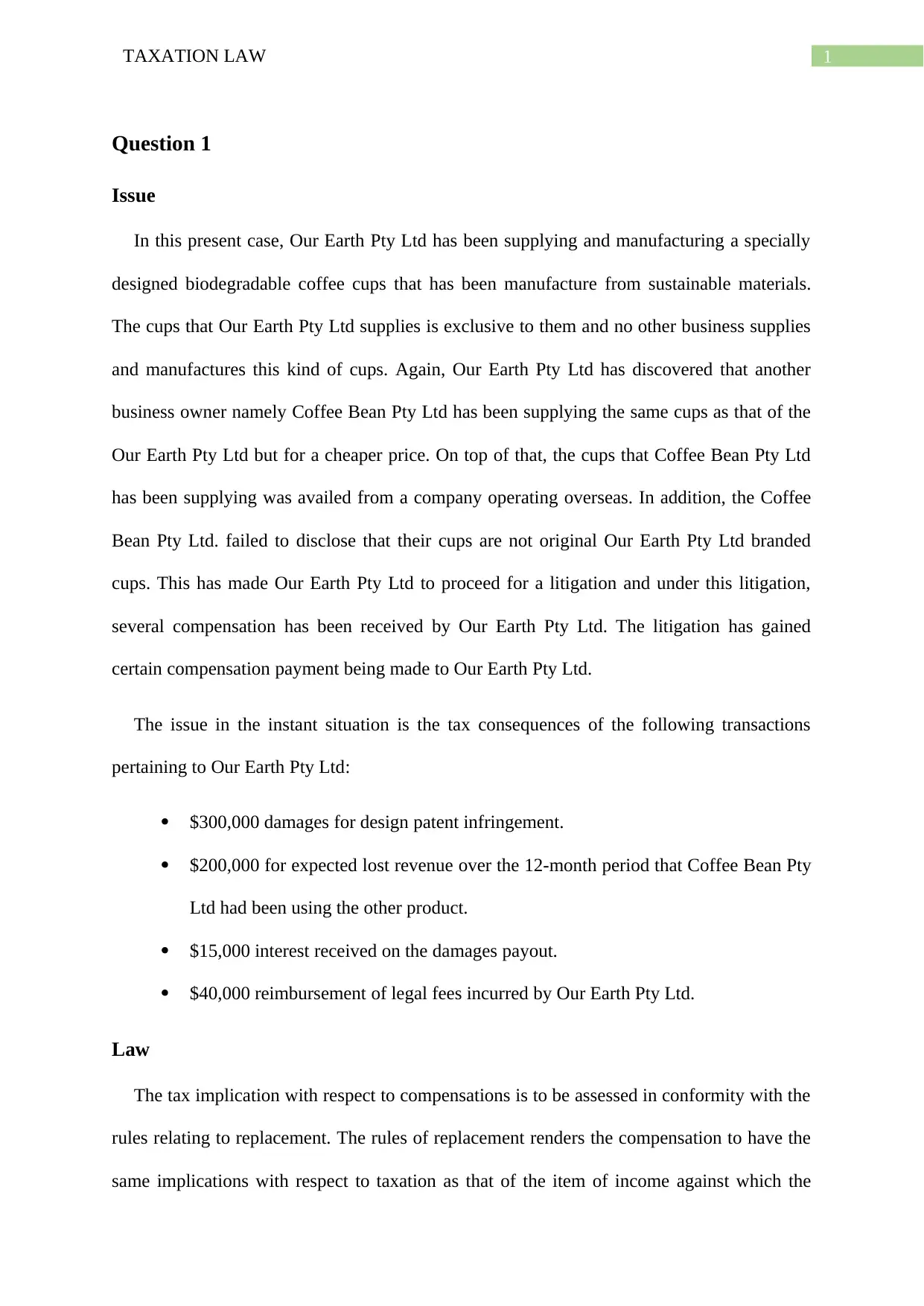
1TAXATION LAW
Question 1
Issue
In this present case, Our Earth Pty Ltd has been supplying and manufacturing a specially
designed biodegradable coffee cups that has been manufacture from sustainable materials.
The cups that Our Earth Pty Ltd supplies is exclusive to them and no other business supplies
and manufactures this kind of cups. Again, Our Earth Pty Ltd has discovered that another
business owner namely Coffee Bean Pty Ltd has been supplying the same cups as that of the
Our Earth Pty Ltd but for a cheaper price. On top of that, the cups that Coffee Bean Pty Ltd
has been supplying was availed from a company operating overseas. In addition, the Coffee
Bean Pty Ltd. failed to disclose that their cups are not original Our Earth Pty Ltd branded
cups. This has made Our Earth Pty Ltd to proceed for a litigation and under this litigation,
several compensation has been received by Our Earth Pty Ltd. The litigation has gained
certain compensation payment being made to Our Earth Pty Ltd.
The issue in the instant situation is the tax consequences of the following transactions
pertaining to Our Earth Pty Ltd:
$300,000 damages for design patent infringement.
$200,000 for expected lost revenue over the 12-month period that Coffee Bean Pty
Ltd had been using the other product.
$15,000 interest received on the damages payout.
$40,000 reimbursement of legal fees incurred by Our Earth Pty Ltd.
Law
The tax implication with respect to compensations is to be assessed in conformity with the
rules relating to replacement. The rules of replacement renders the compensation to have the
same implications with respect to taxation as that of the item of income against which the
Question 1
Issue
In this present case, Our Earth Pty Ltd has been supplying and manufacturing a specially
designed biodegradable coffee cups that has been manufacture from sustainable materials.
The cups that Our Earth Pty Ltd supplies is exclusive to them and no other business supplies
and manufactures this kind of cups. Again, Our Earth Pty Ltd has discovered that another
business owner namely Coffee Bean Pty Ltd has been supplying the same cups as that of the
Our Earth Pty Ltd but for a cheaper price. On top of that, the cups that Coffee Bean Pty Ltd
has been supplying was availed from a company operating overseas. In addition, the Coffee
Bean Pty Ltd. failed to disclose that their cups are not original Our Earth Pty Ltd branded
cups. This has made Our Earth Pty Ltd to proceed for a litigation and under this litigation,
several compensation has been received by Our Earth Pty Ltd. The litigation has gained
certain compensation payment being made to Our Earth Pty Ltd.
The issue in the instant situation is the tax consequences of the following transactions
pertaining to Our Earth Pty Ltd:
$300,000 damages for design patent infringement.
$200,000 for expected lost revenue over the 12-month period that Coffee Bean Pty
Ltd had been using the other product.
$15,000 interest received on the damages payout.
$40,000 reimbursement of legal fees incurred by Our Earth Pty Ltd.
Law
The tax implication with respect to compensations is to be assessed in conformity with the
rules relating to replacement. The rules of replacement renders the compensation to have the
same implications with respect to taxation as that of the item of income against which the
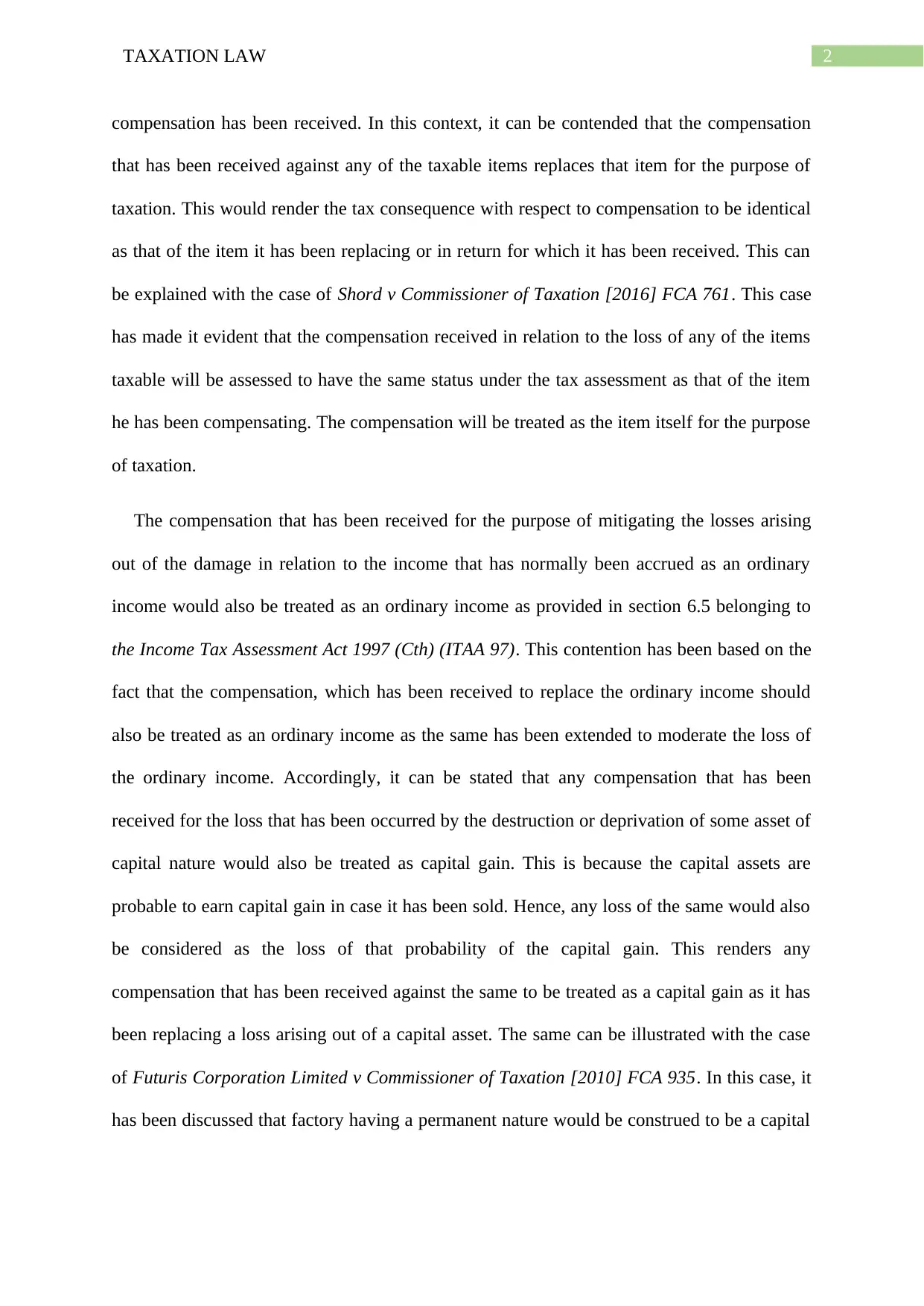
2TAXATION LAW
compensation has been received. In this context, it can be contended that the compensation
that has been received against any of the taxable items replaces that item for the purpose of
taxation. This would render the tax consequence with respect to compensation to be identical
as that of the item it has been replacing or in return for which it has been received. This can
be explained with the case of Shord v Commissioner of Taxation [2016] FCA 761. This case
has made it evident that the compensation received in relation to the loss of any of the items
taxable will be assessed to have the same status under the tax assessment as that of the item
he has been compensating. The compensation will be treated as the item itself for the purpose
of taxation.
The compensation that has been received for the purpose of mitigating the losses arising
out of the damage in relation to the income that has normally been accrued as an ordinary
income would also be treated as an ordinary income as provided in section 6.5 belonging to
the Income Tax Assessment Act 1997 (Cth) (ITAA 97). This contention has been based on the
fact that the compensation, which has been received to replace the ordinary income should
also be treated as an ordinary income as the same has been extended to moderate the loss of
the ordinary income. Accordingly, it can be stated that any compensation that has been
received for the loss that has been occurred by the destruction or deprivation of some asset of
capital nature would also be treated as capital gain. This is because the capital assets are
probable to earn capital gain in case it has been sold. Hence, any loss of the same would also
be considered as the loss of that probability of the capital gain. This renders any
compensation that has been received against the same to be treated as a capital gain as it has
been replacing a loss arising out of a capital asset. The same can be illustrated with the case
of Futuris Corporation Limited v Commissioner of Taxation [2010] FCA 935. In this case, it
has been discussed that factory having a permanent nature would be construed to be a capital
compensation has been received. In this context, it can be contended that the compensation
that has been received against any of the taxable items replaces that item for the purpose of
taxation. This would render the tax consequence with respect to compensation to be identical
as that of the item it has been replacing or in return for which it has been received. This can
be explained with the case of Shord v Commissioner of Taxation [2016] FCA 761. This case
has made it evident that the compensation received in relation to the loss of any of the items
taxable will be assessed to have the same status under the tax assessment as that of the item
he has been compensating. The compensation will be treated as the item itself for the purpose
of taxation.
The compensation that has been received for the purpose of mitigating the losses arising
out of the damage in relation to the income that has normally been accrued as an ordinary
income would also be treated as an ordinary income as provided in section 6.5 belonging to
the Income Tax Assessment Act 1997 (Cth) (ITAA 97). This contention has been based on the
fact that the compensation, which has been received to replace the ordinary income should
also be treated as an ordinary income as the same has been extended to moderate the loss of
the ordinary income. Accordingly, it can be stated that any compensation that has been
received for the loss that has been occurred by the destruction or deprivation of some asset of
capital nature would also be treated as capital gain. This is because the capital assets are
probable to earn capital gain in case it has been sold. Hence, any loss of the same would also
be considered as the loss of that probability of the capital gain. This renders any
compensation that has been received against the same to be treated as a capital gain as it has
been replacing a loss arising out of a capital asset. The same can be illustrated with the case
of Futuris Corporation Limited v Commissioner of Taxation [2010] FCA 935. In this case, it
has been discussed that factory having a permanent nature would be construed to be a capital
⊘ This is a preview!⊘
Do you want full access?
Subscribe today to unlock all pages.

Trusted by 1+ million students worldwide
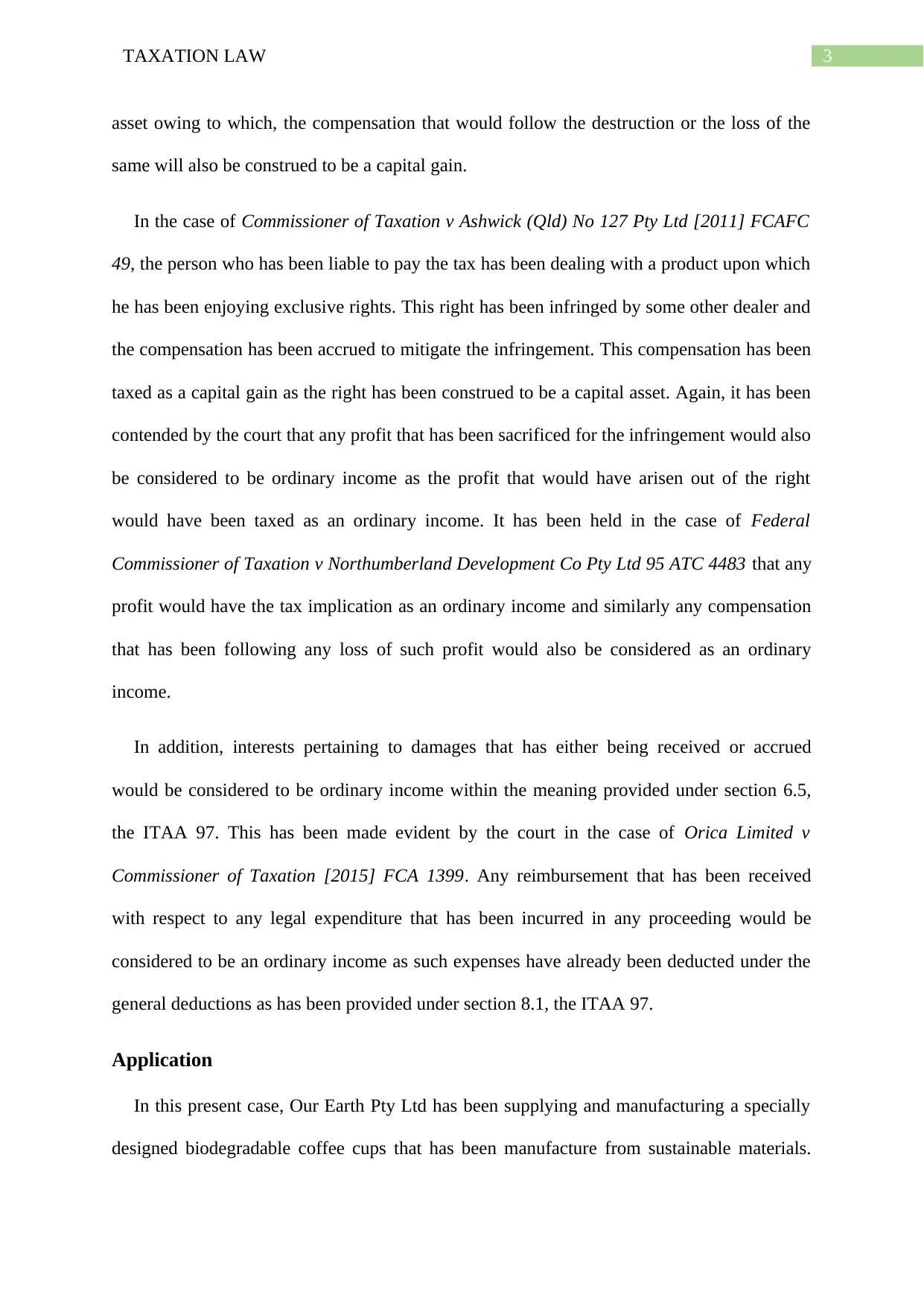
3TAXATION LAW
asset owing to which, the compensation that would follow the destruction or the loss of the
same will also be construed to be a capital gain.
In the case of Commissioner of Taxation v Ashwick (Qld) No 127 Pty Ltd [2011] FCAFC
49, the person who has been liable to pay the tax has been dealing with a product upon which
he has been enjoying exclusive rights. This right has been infringed by some other dealer and
the compensation has been accrued to mitigate the infringement. This compensation has been
taxed as a capital gain as the right has been construed to be a capital asset. Again, it has been
contended by the court that any profit that has been sacrificed for the infringement would also
be considered to be ordinary income as the profit that would have arisen out of the right
would have been taxed as an ordinary income. It has been held in the case of Federal
Commissioner of Taxation v Northumberland Development Co Pty Ltd 95 ATC 4483 that any
profit would have the tax implication as an ordinary income and similarly any compensation
that has been following any loss of such profit would also be considered as an ordinary
income.
In addition, interests pertaining to damages that has either being received or accrued
would be considered to be ordinary income within the meaning provided under section 6.5,
the ITAA 97. This has been made evident by the court in the case of Orica Limited v
Commissioner of Taxation [2015] FCA 1399. Any reimbursement that has been received
with respect to any legal expenditure that has been incurred in any proceeding would be
considered to be an ordinary income as such expenses have already been deducted under the
general deductions as has been provided under section 8.1, the ITAA 97.
Application
In this present case, Our Earth Pty Ltd has been supplying and manufacturing a specially
designed biodegradable coffee cups that has been manufacture from sustainable materials.
asset owing to which, the compensation that would follow the destruction or the loss of the
same will also be construed to be a capital gain.
In the case of Commissioner of Taxation v Ashwick (Qld) No 127 Pty Ltd [2011] FCAFC
49, the person who has been liable to pay the tax has been dealing with a product upon which
he has been enjoying exclusive rights. This right has been infringed by some other dealer and
the compensation has been accrued to mitigate the infringement. This compensation has been
taxed as a capital gain as the right has been construed to be a capital asset. Again, it has been
contended by the court that any profit that has been sacrificed for the infringement would also
be considered to be ordinary income as the profit that would have arisen out of the right
would have been taxed as an ordinary income. It has been held in the case of Federal
Commissioner of Taxation v Northumberland Development Co Pty Ltd 95 ATC 4483 that any
profit would have the tax implication as an ordinary income and similarly any compensation
that has been following any loss of such profit would also be considered as an ordinary
income.
In addition, interests pertaining to damages that has either being received or accrued
would be considered to be ordinary income within the meaning provided under section 6.5,
the ITAA 97. This has been made evident by the court in the case of Orica Limited v
Commissioner of Taxation [2015] FCA 1399. Any reimbursement that has been received
with respect to any legal expenditure that has been incurred in any proceeding would be
considered to be an ordinary income as such expenses have already been deducted under the
general deductions as has been provided under section 8.1, the ITAA 97.
Application
In this present case, Our Earth Pty Ltd has been supplying and manufacturing a specially
designed biodegradable coffee cups that has been manufacture from sustainable materials.
Paraphrase This Document
Need a fresh take? Get an instant paraphrase of this document with our AI Paraphraser
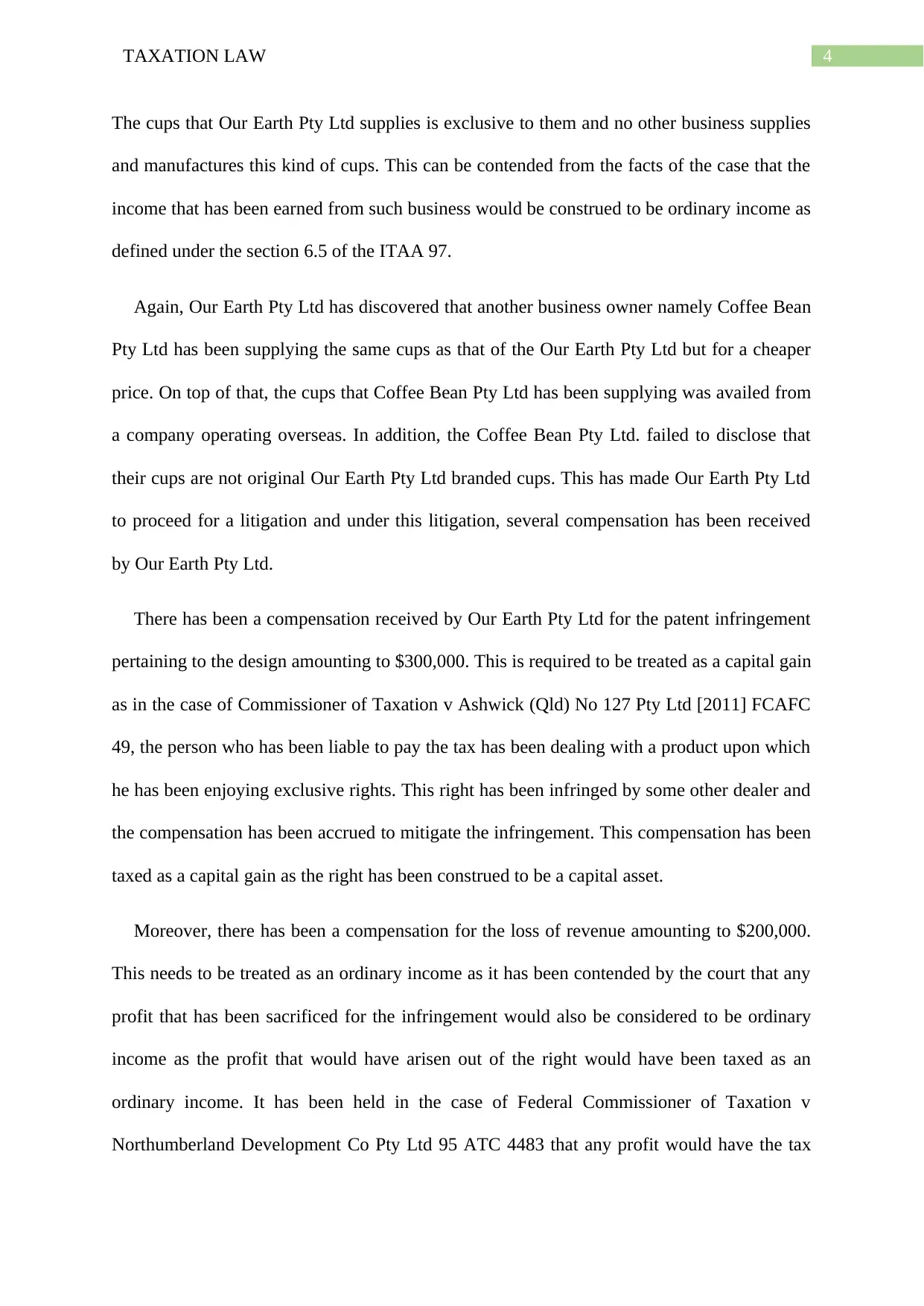
4TAXATION LAW
The cups that Our Earth Pty Ltd supplies is exclusive to them and no other business supplies
and manufactures this kind of cups. This can be contended from the facts of the case that the
income that has been earned from such business would be construed to be ordinary income as
defined under the section 6.5 of the ITAA 97.
Again, Our Earth Pty Ltd has discovered that another business owner namely Coffee Bean
Pty Ltd has been supplying the same cups as that of the Our Earth Pty Ltd but for a cheaper
price. On top of that, the cups that Coffee Bean Pty Ltd has been supplying was availed from
a company operating overseas. In addition, the Coffee Bean Pty Ltd. failed to disclose that
their cups are not original Our Earth Pty Ltd branded cups. This has made Our Earth Pty Ltd
to proceed for a litigation and under this litigation, several compensation has been received
by Our Earth Pty Ltd.
There has been a compensation received by Our Earth Pty Ltd for the patent infringement
pertaining to the design amounting to $300,000. This is required to be treated as a capital gain
as in the case of Commissioner of Taxation v Ashwick (Qld) No 127 Pty Ltd [2011] FCAFC
49, the person who has been liable to pay the tax has been dealing with a product upon which
he has been enjoying exclusive rights. This right has been infringed by some other dealer and
the compensation has been accrued to mitigate the infringement. This compensation has been
taxed as a capital gain as the right has been construed to be a capital asset.
Moreover, there has been a compensation for the loss of revenue amounting to $200,000.
This needs to be treated as an ordinary income as it has been contended by the court that any
profit that has been sacrificed for the infringement would also be considered to be ordinary
income as the profit that would have arisen out of the right would have been taxed as an
ordinary income. It has been held in the case of Federal Commissioner of Taxation v
Northumberland Development Co Pty Ltd 95 ATC 4483 that any profit would have the tax
The cups that Our Earth Pty Ltd supplies is exclusive to them and no other business supplies
and manufactures this kind of cups. This can be contended from the facts of the case that the
income that has been earned from such business would be construed to be ordinary income as
defined under the section 6.5 of the ITAA 97.
Again, Our Earth Pty Ltd has discovered that another business owner namely Coffee Bean
Pty Ltd has been supplying the same cups as that of the Our Earth Pty Ltd but for a cheaper
price. On top of that, the cups that Coffee Bean Pty Ltd has been supplying was availed from
a company operating overseas. In addition, the Coffee Bean Pty Ltd. failed to disclose that
their cups are not original Our Earth Pty Ltd branded cups. This has made Our Earth Pty Ltd
to proceed for a litigation and under this litigation, several compensation has been received
by Our Earth Pty Ltd.
There has been a compensation received by Our Earth Pty Ltd for the patent infringement
pertaining to the design amounting to $300,000. This is required to be treated as a capital gain
as in the case of Commissioner of Taxation v Ashwick (Qld) No 127 Pty Ltd [2011] FCAFC
49, the person who has been liable to pay the tax has been dealing with a product upon which
he has been enjoying exclusive rights. This right has been infringed by some other dealer and
the compensation has been accrued to mitigate the infringement. This compensation has been
taxed as a capital gain as the right has been construed to be a capital asset.
Moreover, there has been a compensation for the loss of revenue amounting to $200,000.
This needs to be treated as an ordinary income as it has been contended by the court that any
profit that has been sacrificed for the infringement would also be considered to be ordinary
income as the profit that would have arisen out of the right would have been taxed as an
ordinary income. It has been held in the case of Federal Commissioner of Taxation v
Northumberland Development Co Pty Ltd 95 ATC 4483 that any profit would have the tax
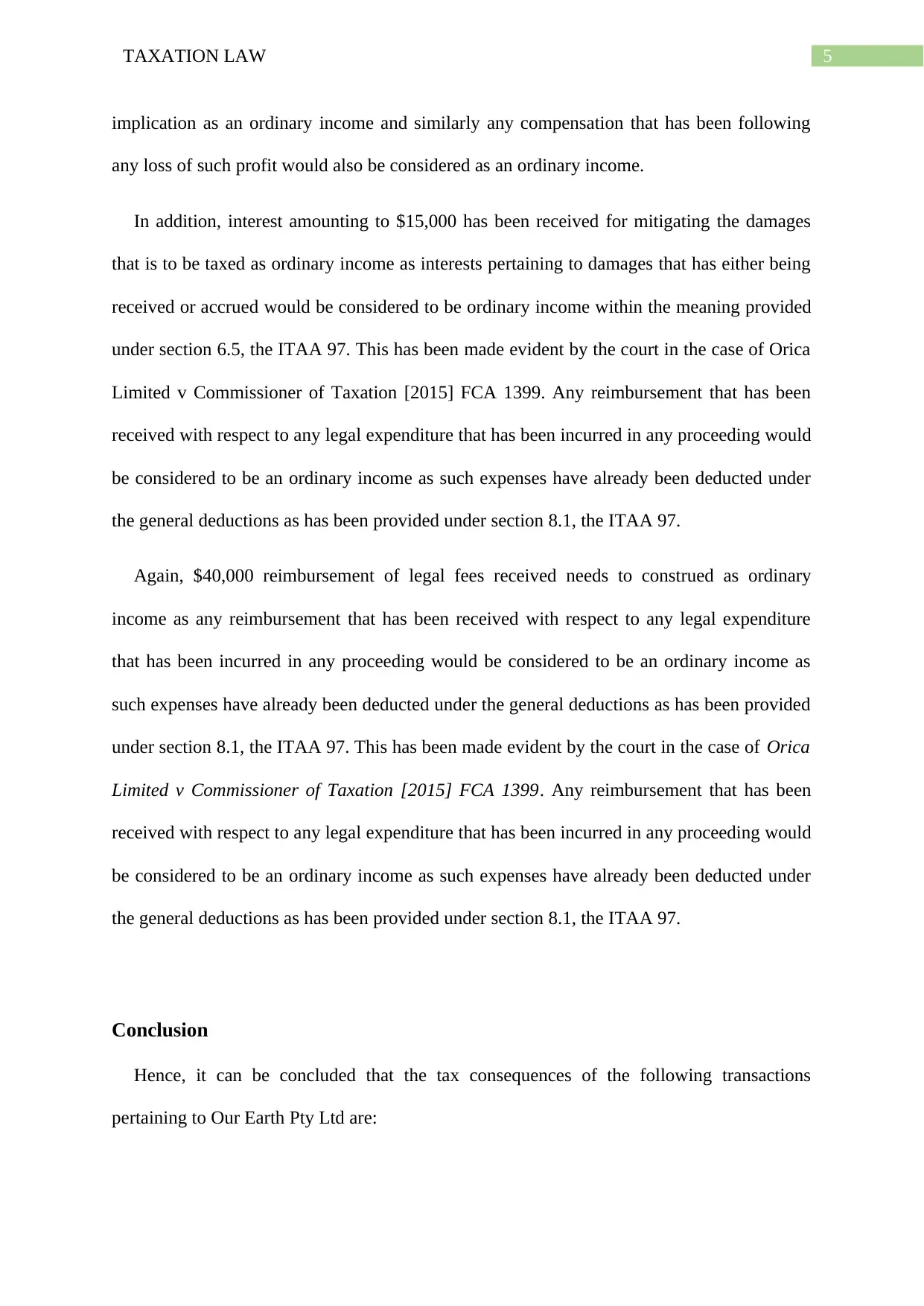
5TAXATION LAW
implication as an ordinary income and similarly any compensation that has been following
any loss of such profit would also be considered as an ordinary income.
In addition, interest amounting to $15,000 has been received for mitigating the damages
that is to be taxed as ordinary income as interests pertaining to damages that has either being
received or accrued would be considered to be ordinary income within the meaning provided
under section 6.5, the ITAA 97. This has been made evident by the court in the case of Orica
Limited v Commissioner of Taxation [2015] FCA 1399. Any reimbursement that has been
received with respect to any legal expenditure that has been incurred in any proceeding would
be considered to be an ordinary income as such expenses have already been deducted under
the general deductions as has been provided under section 8.1, the ITAA 97.
Again, $40,000 reimbursement of legal fees received needs to construed as ordinary
income as any reimbursement that has been received with respect to any legal expenditure
that has been incurred in any proceeding would be considered to be an ordinary income as
such expenses have already been deducted under the general deductions as has been provided
under section 8.1, the ITAA 97. This has been made evident by the court in the case of Orica
Limited v Commissioner of Taxation [2015] FCA 1399. Any reimbursement that has been
received with respect to any legal expenditure that has been incurred in any proceeding would
be considered to be an ordinary income as such expenses have already been deducted under
the general deductions as has been provided under section 8.1, the ITAA 97.
Conclusion
Hence, it can be concluded that the tax consequences of the following transactions
pertaining to Our Earth Pty Ltd are:
implication as an ordinary income and similarly any compensation that has been following
any loss of such profit would also be considered as an ordinary income.
In addition, interest amounting to $15,000 has been received for mitigating the damages
that is to be taxed as ordinary income as interests pertaining to damages that has either being
received or accrued would be considered to be ordinary income within the meaning provided
under section 6.5, the ITAA 97. This has been made evident by the court in the case of Orica
Limited v Commissioner of Taxation [2015] FCA 1399. Any reimbursement that has been
received with respect to any legal expenditure that has been incurred in any proceeding would
be considered to be an ordinary income as such expenses have already been deducted under
the general deductions as has been provided under section 8.1, the ITAA 97.
Again, $40,000 reimbursement of legal fees received needs to construed as ordinary
income as any reimbursement that has been received with respect to any legal expenditure
that has been incurred in any proceeding would be considered to be an ordinary income as
such expenses have already been deducted under the general deductions as has been provided
under section 8.1, the ITAA 97. This has been made evident by the court in the case of Orica
Limited v Commissioner of Taxation [2015] FCA 1399. Any reimbursement that has been
received with respect to any legal expenditure that has been incurred in any proceeding would
be considered to be an ordinary income as such expenses have already been deducted under
the general deductions as has been provided under section 8.1, the ITAA 97.
Conclusion
Hence, it can be concluded that the tax consequences of the following transactions
pertaining to Our Earth Pty Ltd are:
⊘ This is a preview!⊘
Do you want full access?
Subscribe today to unlock all pages.

Trusted by 1+ million students worldwide
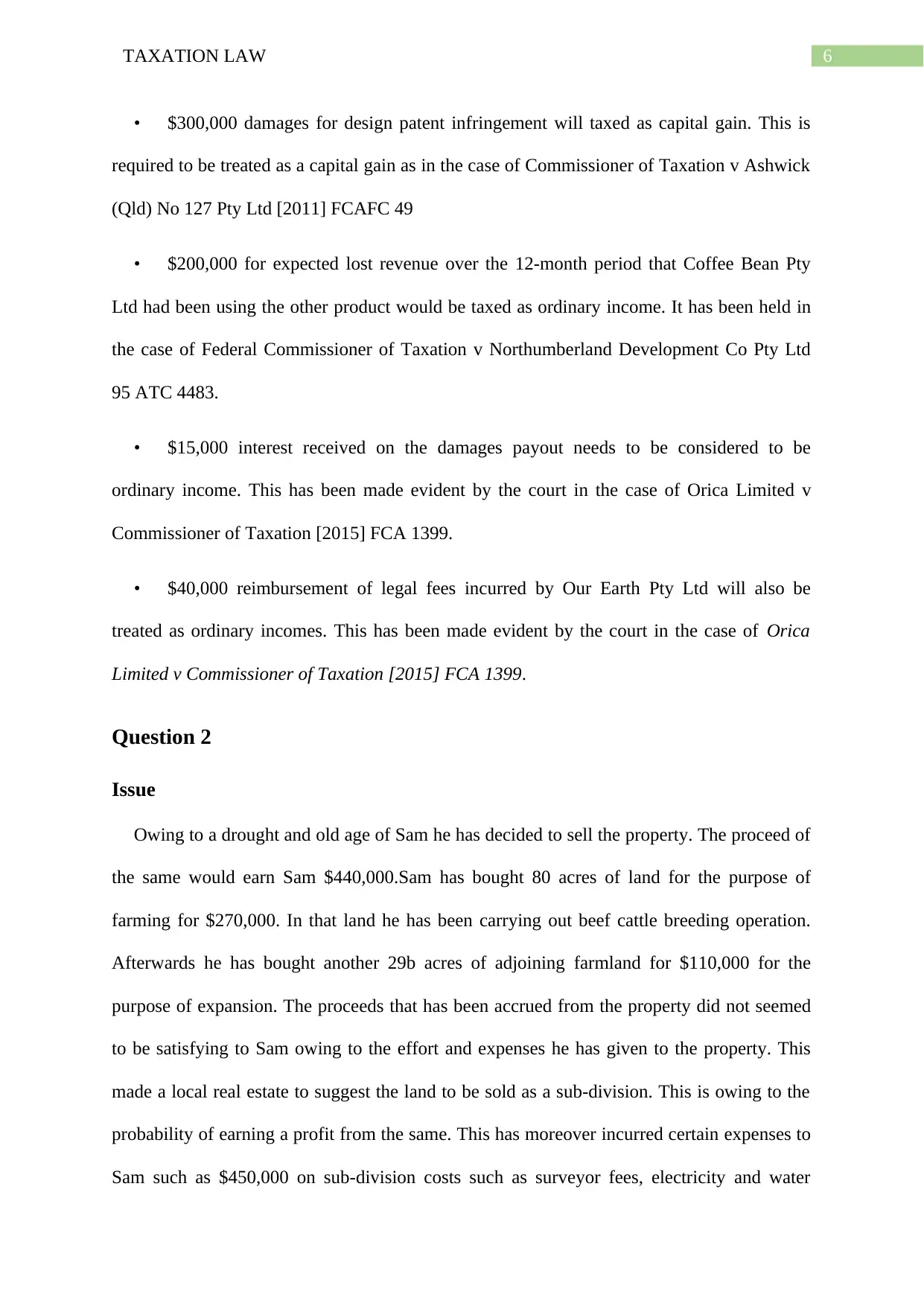
6TAXATION LAW
• $300,000 damages for design patent infringement will taxed as capital gain. This is
required to be treated as a capital gain as in the case of Commissioner of Taxation v Ashwick
(Qld) No 127 Pty Ltd [2011] FCAFC 49
• $200,000 for expected lost revenue over the 12-month period that Coffee Bean Pty
Ltd had been using the other product would be taxed as ordinary income. It has been held in
the case of Federal Commissioner of Taxation v Northumberland Development Co Pty Ltd
95 ATC 4483.
• $15,000 interest received on the damages payout needs to be considered to be
ordinary income. This has been made evident by the court in the case of Orica Limited v
Commissioner of Taxation [2015] FCA 1399.
• $40,000 reimbursement of legal fees incurred by Our Earth Pty Ltd will also be
treated as ordinary incomes. This has been made evident by the court in the case of Orica
Limited v Commissioner of Taxation [2015] FCA 1399.
Question 2
Issue
Owing to a drought and old age of Sam he has decided to sell the property. The proceed of
the same would earn Sam $440,000.Sam has bought 80 acres of land for the purpose of
farming for $270,000. In that land he has been carrying out beef cattle breeding operation.
Afterwards he has bought another 29b acres of adjoining farmland for $110,000 for the
purpose of expansion. The proceeds that has been accrued from the property did not seemed
to be satisfying to Sam owing to the effort and expenses he has given to the property. This
made a local real estate to suggest the land to be sold as a sub-division. This is owing to the
probability of earning a profit from the same. This has moreover incurred certain expenses to
Sam such as $450,000 on sub-division costs such as surveyor fees, electricity and water
• $300,000 damages for design patent infringement will taxed as capital gain. This is
required to be treated as a capital gain as in the case of Commissioner of Taxation v Ashwick
(Qld) No 127 Pty Ltd [2011] FCAFC 49
• $200,000 for expected lost revenue over the 12-month period that Coffee Bean Pty
Ltd had been using the other product would be taxed as ordinary income. It has been held in
the case of Federal Commissioner of Taxation v Northumberland Development Co Pty Ltd
95 ATC 4483.
• $15,000 interest received on the damages payout needs to be considered to be
ordinary income. This has been made evident by the court in the case of Orica Limited v
Commissioner of Taxation [2015] FCA 1399.
• $40,000 reimbursement of legal fees incurred by Our Earth Pty Ltd will also be
treated as ordinary incomes. This has been made evident by the court in the case of Orica
Limited v Commissioner of Taxation [2015] FCA 1399.
Question 2
Issue
Owing to a drought and old age of Sam he has decided to sell the property. The proceed of
the same would earn Sam $440,000.Sam has bought 80 acres of land for the purpose of
farming for $270,000. In that land he has been carrying out beef cattle breeding operation.
Afterwards he has bought another 29b acres of adjoining farmland for $110,000 for the
purpose of expansion. The proceeds that has been accrued from the property did not seemed
to be satisfying to Sam owing to the effort and expenses he has given to the property. This
made a local real estate to suggest the land to be sold as a sub-division. This is owing to the
probability of earning a profit from the same. This has moreover incurred certain expenses to
Sam such as $450,000 on sub-division costs such as surveyor fees, electricity and water
Paraphrase This Document
Need a fresh take? Get an instant paraphrase of this document with our AI Paraphraser
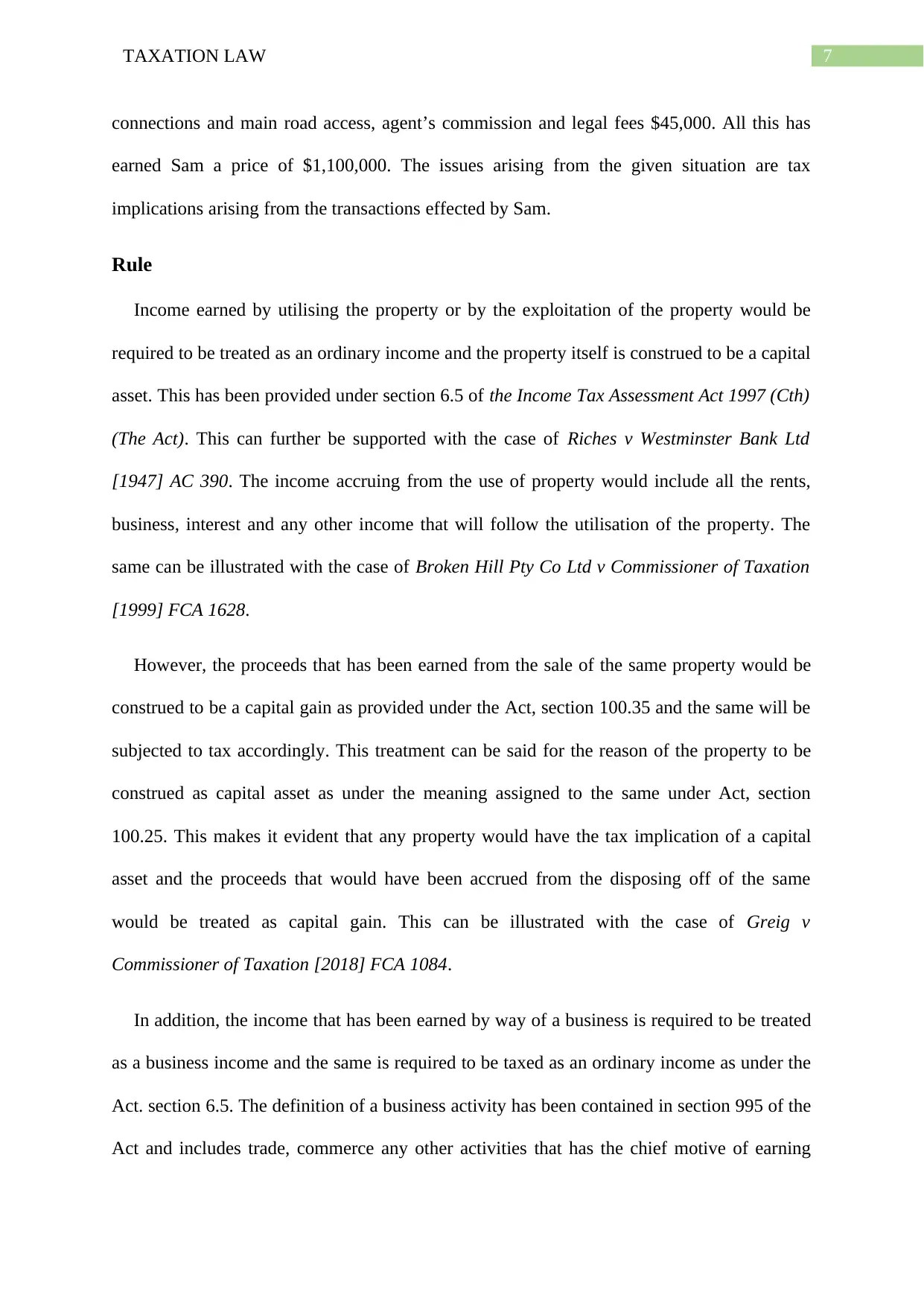
7TAXATION LAW
connections and main road access, agent’s commission and legal fees $45,000. All this has
earned Sam a price of $1,100,000. The issues arising from the given situation are tax
implications arising from the transactions effected by Sam.
Rule
Income earned by utilising the property or by the exploitation of the property would be
required to be treated as an ordinary income and the property itself is construed to be a capital
asset. This has been provided under section 6.5 of the Income Tax Assessment Act 1997 (Cth)
(The Act). This can further be supported with the case of Riches v Westminster Bank Ltd
[1947] AC 390. The income accruing from the use of property would include all the rents,
business, interest and any other income that will follow the utilisation of the property. The
same can be illustrated with the case of Broken Hill Pty Co Ltd v Commissioner of Taxation
[1999] FCA 1628.
However, the proceeds that has been earned from the sale of the same property would be
construed to be a capital gain as provided under the Act, section 100.35 and the same will be
subjected to tax accordingly. This treatment can be said for the reason of the property to be
construed as capital asset as under the meaning assigned to the same under Act, section
100.25. This makes it evident that any property would have the tax implication of a capital
asset and the proceeds that would have been accrued from the disposing off of the same
would be treated as capital gain. This can be illustrated with the case of Greig v
Commissioner of Taxation [2018] FCA 1084.
In addition, the income that has been earned by way of a business is required to be treated
as a business income and the same is required to be taxed as an ordinary income as under the
Act. section 6.5. The definition of a business activity has been contained in section 995 of the
Act and includes trade, commerce any other activities that has the chief motive of earning
connections and main road access, agent’s commission and legal fees $45,000. All this has
earned Sam a price of $1,100,000. The issues arising from the given situation are tax
implications arising from the transactions effected by Sam.
Rule
Income earned by utilising the property or by the exploitation of the property would be
required to be treated as an ordinary income and the property itself is construed to be a capital
asset. This has been provided under section 6.5 of the Income Tax Assessment Act 1997 (Cth)
(The Act). This can further be supported with the case of Riches v Westminster Bank Ltd
[1947] AC 390. The income accruing from the use of property would include all the rents,
business, interest and any other income that will follow the utilisation of the property. The
same can be illustrated with the case of Broken Hill Pty Co Ltd v Commissioner of Taxation
[1999] FCA 1628.
However, the proceeds that has been earned from the sale of the same property would be
construed to be a capital gain as provided under the Act, section 100.35 and the same will be
subjected to tax accordingly. This treatment can be said for the reason of the property to be
construed as capital asset as under the meaning assigned to the same under Act, section
100.25. This makes it evident that any property would have the tax implication of a capital
asset and the proceeds that would have been accrued from the disposing off of the same
would be treated as capital gain. This can be illustrated with the case of Greig v
Commissioner of Taxation [2018] FCA 1084.
In addition, the income that has been earned by way of a business is required to be treated
as a business income and the same is required to be taxed as an ordinary income as under the
Act. section 6.5. The definition of a business activity has been contained in section 995 of the
Act and includes trade, commerce any other activities that has the chief motive of earning
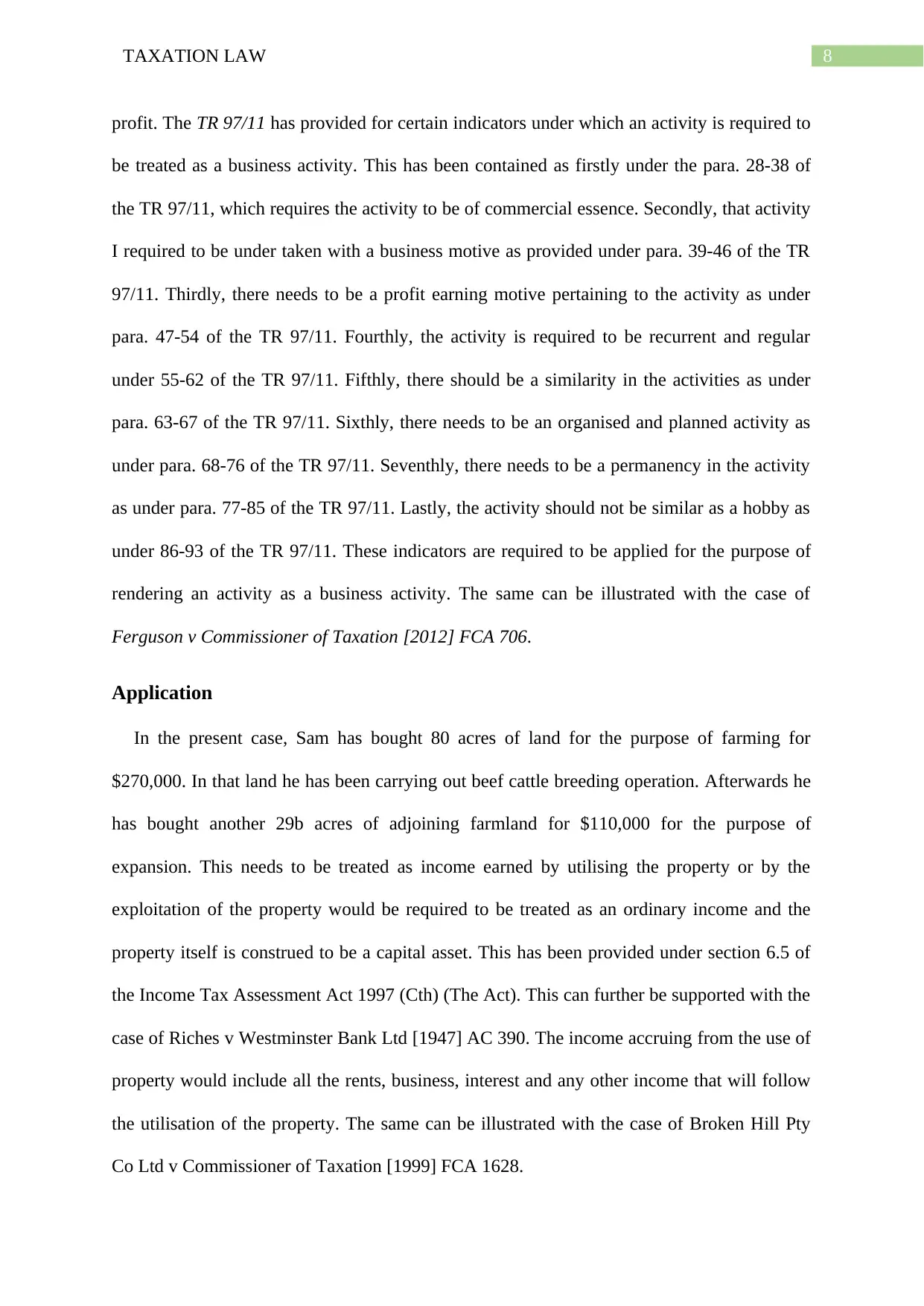
8TAXATION LAW
profit. The TR 97/11 has provided for certain indicators under which an activity is required to
be treated as a business activity. This has been contained as firstly under the para. 28-38 of
the TR 97/11, which requires the activity to be of commercial essence. Secondly, that activity
I required to be under taken with a business motive as provided under para. 39-46 of the TR
97/11. Thirdly, there needs to be a profit earning motive pertaining to the activity as under
para. 47-54 of the TR 97/11. Fourthly, the activity is required to be recurrent and regular
under 55-62 of the TR 97/11. Fifthly, there should be a similarity in the activities as under
para. 63-67 of the TR 97/11. Sixthly, there needs to be an organised and planned activity as
under para. 68-76 of the TR 97/11. Seventhly, there needs to be a permanency in the activity
as under para. 77-85 of the TR 97/11. Lastly, the activity should not be similar as a hobby as
under 86-93 of the TR 97/11. These indicators are required to be applied for the purpose of
rendering an activity as a business activity. The same can be illustrated with the case of
Ferguson v Commissioner of Taxation [2012] FCA 706.
Application
In the present case, Sam has bought 80 acres of land for the purpose of farming for
$270,000. In that land he has been carrying out beef cattle breeding operation. Afterwards he
has bought another 29b acres of adjoining farmland for $110,000 for the purpose of
expansion. This needs to be treated as income earned by utilising the property or by the
exploitation of the property would be required to be treated as an ordinary income and the
property itself is construed to be a capital asset. This has been provided under section 6.5 of
the Income Tax Assessment Act 1997 (Cth) (The Act). This can further be supported with the
case of Riches v Westminster Bank Ltd [1947] AC 390. The income accruing from the use of
property would include all the rents, business, interest and any other income that will follow
the utilisation of the property. The same can be illustrated with the case of Broken Hill Pty
Co Ltd v Commissioner of Taxation [1999] FCA 1628.
profit. The TR 97/11 has provided for certain indicators under which an activity is required to
be treated as a business activity. This has been contained as firstly under the para. 28-38 of
the TR 97/11, which requires the activity to be of commercial essence. Secondly, that activity
I required to be under taken with a business motive as provided under para. 39-46 of the TR
97/11. Thirdly, there needs to be a profit earning motive pertaining to the activity as under
para. 47-54 of the TR 97/11. Fourthly, the activity is required to be recurrent and regular
under 55-62 of the TR 97/11. Fifthly, there should be a similarity in the activities as under
para. 63-67 of the TR 97/11. Sixthly, there needs to be an organised and planned activity as
under para. 68-76 of the TR 97/11. Seventhly, there needs to be a permanency in the activity
as under para. 77-85 of the TR 97/11. Lastly, the activity should not be similar as a hobby as
under 86-93 of the TR 97/11. These indicators are required to be applied for the purpose of
rendering an activity as a business activity. The same can be illustrated with the case of
Ferguson v Commissioner of Taxation [2012] FCA 706.
Application
In the present case, Sam has bought 80 acres of land for the purpose of farming for
$270,000. In that land he has been carrying out beef cattle breeding operation. Afterwards he
has bought another 29b acres of adjoining farmland for $110,000 for the purpose of
expansion. This needs to be treated as income earned by utilising the property or by the
exploitation of the property would be required to be treated as an ordinary income and the
property itself is construed to be a capital asset. This has been provided under section 6.5 of
the Income Tax Assessment Act 1997 (Cth) (The Act). This can further be supported with the
case of Riches v Westminster Bank Ltd [1947] AC 390. The income accruing from the use of
property would include all the rents, business, interest and any other income that will follow
the utilisation of the property. The same can be illustrated with the case of Broken Hill Pty
Co Ltd v Commissioner of Taxation [1999] FCA 1628.
⊘ This is a preview!⊘
Do you want full access?
Subscribe today to unlock all pages.

Trusted by 1+ million students worldwide
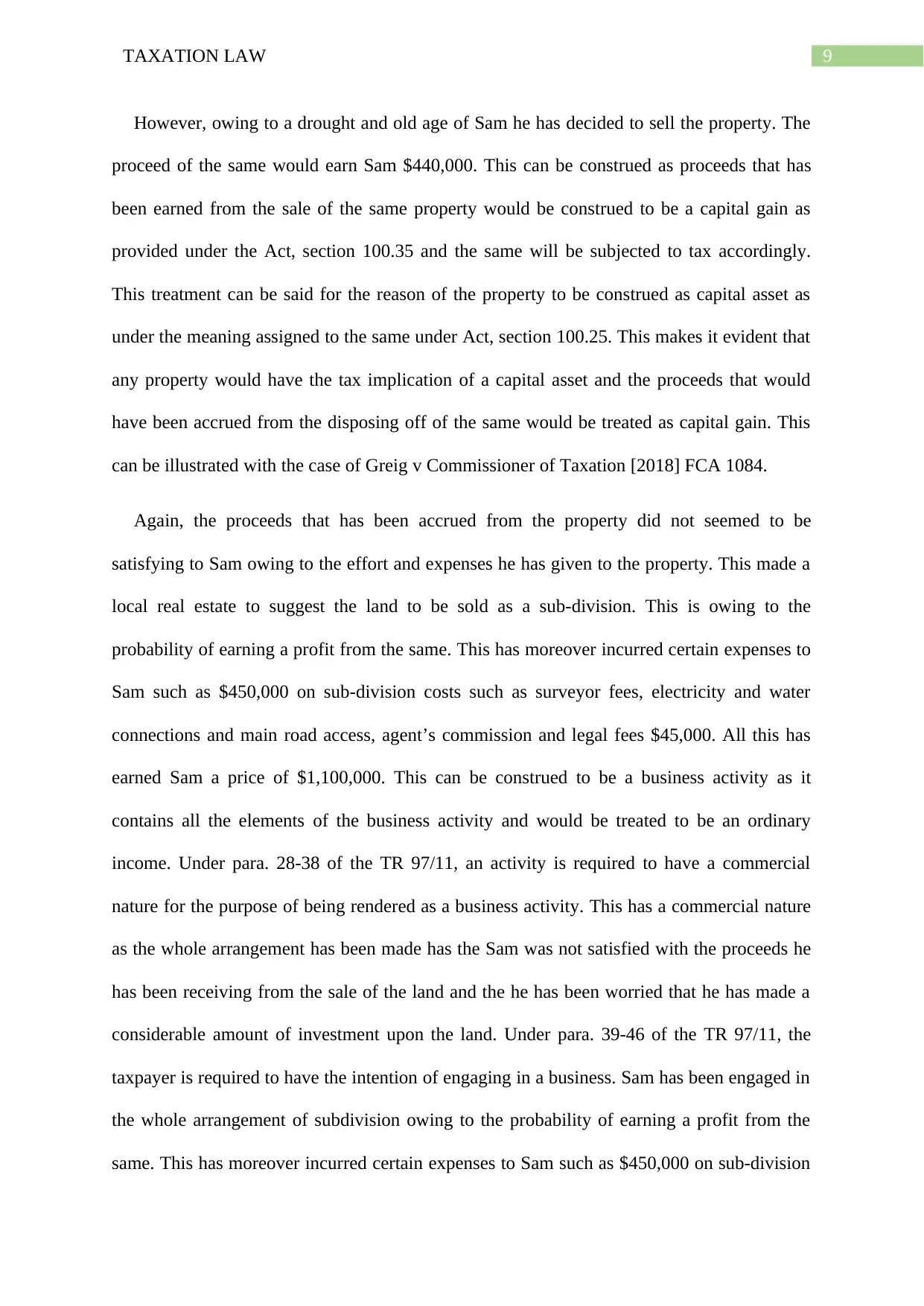
9TAXATION LAW
However, owing to a drought and old age of Sam he has decided to sell the property. The
proceed of the same would earn Sam $440,000. This can be construed as proceeds that has
been earned from the sale of the same property would be construed to be a capital gain as
provided under the Act, section 100.35 and the same will be subjected to tax accordingly.
This treatment can be said for the reason of the property to be construed as capital asset as
under the meaning assigned to the same under Act, section 100.25. This makes it evident that
any property would have the tax implication of a capital asset and the proceeds that would
have been accrued from the disposing off of the same would be treated as capital gain. This
can be illustrated with the case of Greig v Commissioner of Taxation [2018] FCA 1084.
Again, the proceeds that has been accrued from the property did not seemed to be
satisfying to Sam owing to the effort and expenses he has given to the property. This made a
local real estate to suggest the land to be sold as a sub-division. This is owing to the
probability of earning a profit from the same. This has moreover incurred certain expenses to
Sam such as $450,000 on sub-division costs such as surveyor fees, electricity and water
connections and main road access, agent’s commission and legal fees $45,000. All this has
earned Sam a price of $1,100,000. This can be construed to be a business activity as it
contains all the elements of the business activity and would be treated to be an ordinary
income. Under para. 28-38 of the TR 97/11, an activity is required to have a commercial
nature for the purpose of being rendered as a business activity. This has a commercial nature
as the whole arrangement has been made has the Sam was not satisfied with the proceeds he
has been receiving from the sale of the land and the he has been worried that he has made a
considerable amount of investment upon the land. Under para. 39-46 of the TR 97/11, the
taxpayer is required to have the intention of engaging in a business. Sam has been engaged in
the whole arrangement of subdivision owing to the probability of earning a profit from the
same. This has moreover incurred certain expenses to Sam such as $450,000 on sub-division
However, owing to a drought and old age of Sam he has decided to sell the property. The
proceed of the same would earn Sam $440,000. This can be construed as proceeds that has
been earned from the sale of the same property would be construed to be a capital gain as
provided under the Act, section 100.35 and the same will be subjected to tax accordingly.
This treatment can be said for the reason of the property to be construed as capital asset as
under the meaning assigned to the same under Act, section 100.25. This makes it evident that
any property would have the tax implication of a capital asset and the proceeds that would
have been accrued from the disposing off of the same would be treated as capital gain. This
can be illustrated with the case of Greig v Commissioner of Taxation [2018] FCA 1084.
Again, the proceeds that has been accrued from the property did not seemed to be
satisfying to Sam owing to the effort and expenses he has given to the property. This made a
local real estate to suggest the land to be sold as a sub-division. This is owing to the
probability of earning a profit from the same. This has moreover incurred certain expenses to
Sam such as $450,000 on sub-division costs such as surveyor fees, electricity and water
connections and main road access, agent’s commission and legal fees $45,000. All this has
earned Sam a price of $1,100,000. This can be construed to be a business activity as it
contains all the elements of the business activity and would be treated to be an ordinary
income. Under para. 28-38 of the TR 97/11, an activity is required to have a commercial
nature for the purpose of being rendered as a business activity. This has a commercial nature
as the whole arrangement has been made has the Sam was not satisfied with the proceeds he
has been receiving from the sale of the land and the he has been worried that he has made a
considerable amount of investment upon the land. Under para. 39-46 of the TR 97/11, the
taxpayer is required to have the intention of engaging in a business. Sam has been engaged in
the whole arrangement of subdivision owing to the probability of earning a profit from the
same. This has moreover incurred certain expenses to Sam such as $450,000 on sub-division
Paraphrase This Document
Need a fresh take? Get an instant paraphrase of this document with our AI Paraphraser
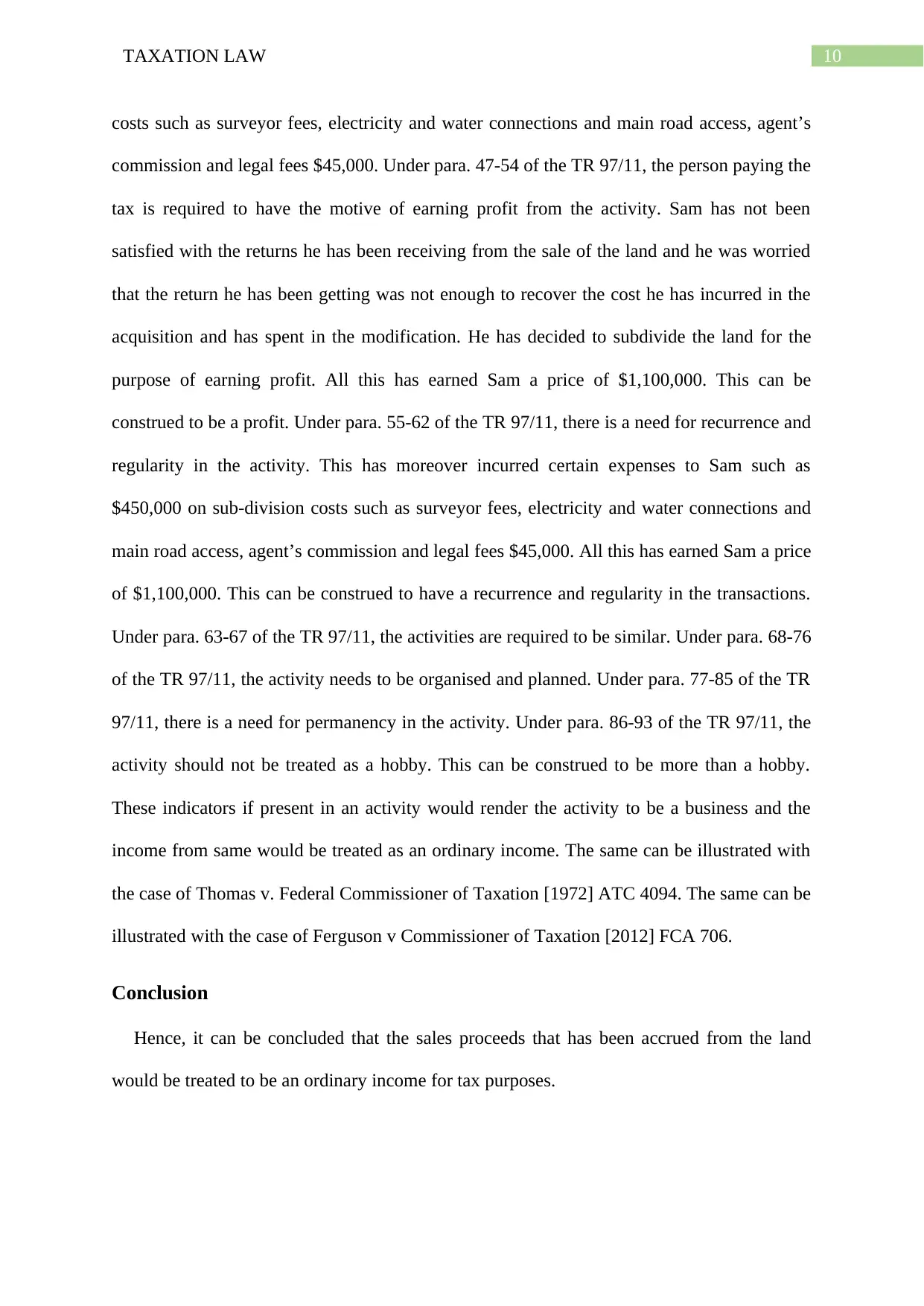
10TAXATION LAW
costs such as surveyor fees, electricity and water connections and main road access, agent’s
commission and legal fees $45,000. Under para. 47-54 of the TR 97/11, the person paying the
tax is required to have the motive of earning profit from the activity. Sam has not been
satisfied with the returns he has been receiving from the sale of the land and he was worried
that the return he has been getting was not enough to recover the cost he has incurred in the
acquisition and has spent in the modification. He has decided to subdivide the land for the
purpose of earning profit. All this has earned Sam a price of $1,100,000. This can be
construed to be a profit. Under para. 55-62 of the TR 97/11, there is a need for recurrence and
regularity in the activity. This has moreover incurred certain expenses to Sam such as
$450,000 on sub-division costs such as surveyor fees, electricity and water connections and
main road access, agent’s commission and legal fees $45,000. All this has earned Sam a price
of $1,100,000. This can be construed to have a recurrence and regularity in the transactions.
Under para. 63-67 of the TR 97/11, the activities are required to be similar. Under para. 68-76
of the TR 97/11, the activity needs to be organised and planned. Under para. 77-85 of the TR
97/11, there is a need for permanency in the activity. Under para. 86-93 of the TR 97/11, the
activity should not be treated as a hobby. This can be construed to be more than a hobby.
These indicators if present in an activity would render the activity to be a business and the
income from same would be treated as an ordinary income. The same can be illustrated with
the case of Thomas v. Federal Commissioner of Taxation [1972] ATC 4094. The same can be
illustrated with the case of Ferguson v Commissioner of Taxation [2012] FCA 706.
Conclusion
Hence, it can be concluded that the sales proceeds that has been accrued from the land
would be treated to be an ordinary income for tax purposes.
costs such as surveyor fees, electricity and water connections and main road access, agent’s
commission and legal fees $45,000. Under para. 47-54 of the TR 97/11, the person paying the
tax is required to have the motive of earning profit from the activity. Sam has not been
satisfied with the returns he has been receiving from the sale of the land and he was worried
that the return he has been getting was not enough to recover the cost he has incurred in the
acquisition and has spent in the modification. He has decided to subdivide the land for the
purpose of earning profit. All this has earned Sam a price of $1,100,000. This can be
construed to be a profit. Under para. 55-62 of the TR 97/11, there is a need for recurrence and
regularity in the activity. This has moreover incurred certain expenses to Sam such as
$450,000 on sub-division costs such as surveyor fees, electricity and water connections and
main road access, agent’s commission and legal fees $45,000. All this has earned Sam a price
of $1,100,000. This can be construed to have a recurrence and regularity in the transactions.
Under para. 63-67 of the TR 97/11, the activities are required to be similar. Under para. 68-76
of the TR 97/11, the activity needs to be organised and planned. Under para. 77-85 of the TR
97/11, there is a need for permanency in the activity. Under para. 86-93 of the TR 97/11, the
activity should not be treated as a hobby. This can be construed to be more than a hobby.
These indicators if present in an activity would render the activity to be a business and the
income from same would be treated as an ordinary income. The same can be illustrated with
the case of Thomas v. Federal Commissioner of Taxation [1972] ATC 4094. The same can be
illustrated with the case of Ferguson v Commissioner of Taxation [2012] FCA 706.
Conclusion
Hence, it can be concluded that the sales proceeds that has been accrued from the land
would be treated to be an ordinary income for tax purposes.
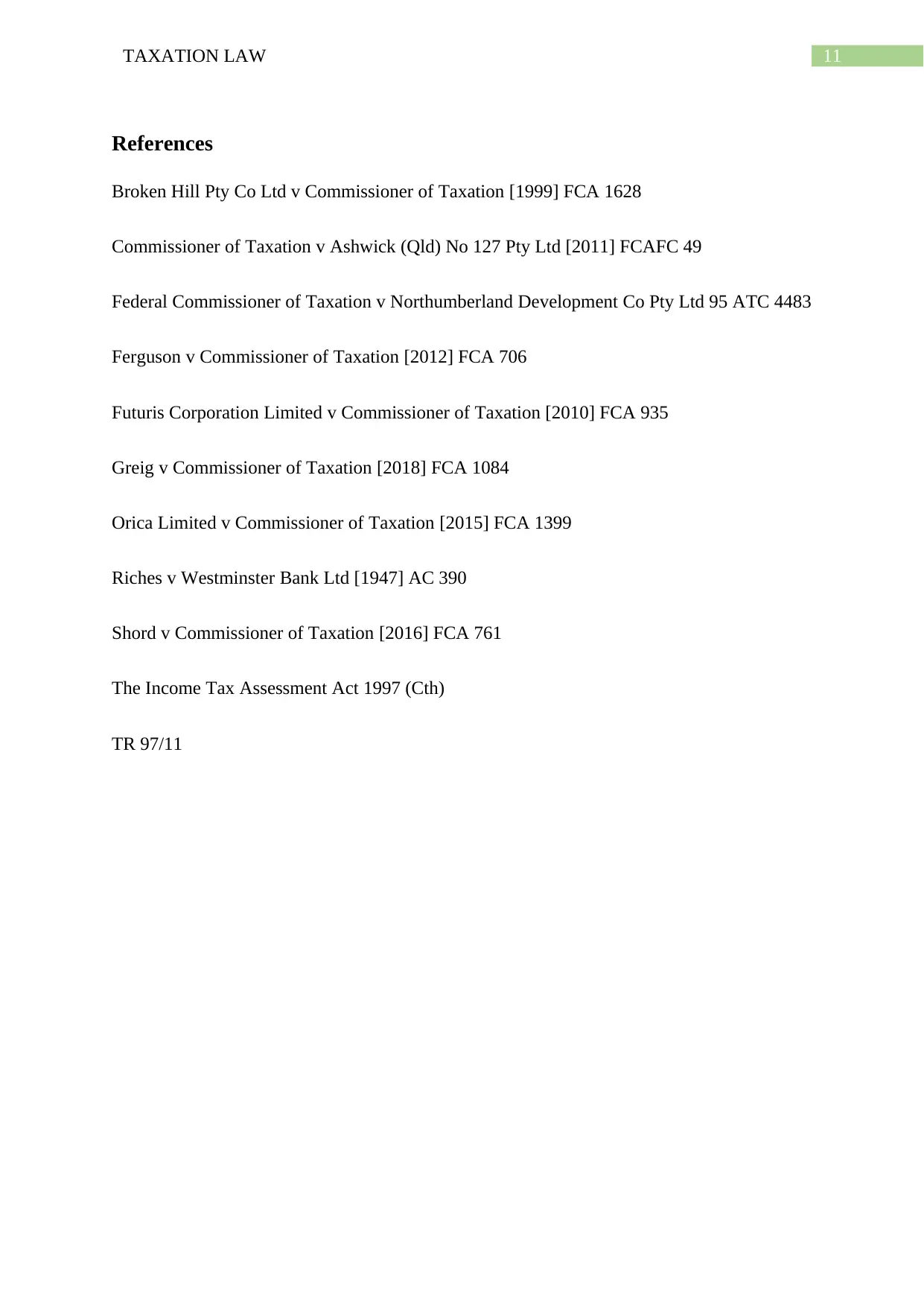
11TAXATION LAW
References
Broken Hill Pty Co Ltd v Commissioner of Taxation [1999] FCA 1628
Commissioner of Taxation v Ashwick (Qld) No 127 Pty Ltd [2011] FCAFC 49
Federal Commissioner of Taxation v Northumberland Development Co Pty Ltd 95 ATC 4483
Ferguson v Commissioner of Taxation [2012] FCA 706
Futuris Corporation Limited v Commissioner of Taxation [2010] FCA 935
Greig v Commissioner of Taxation [2018] FCA 1084
Orica Limited v Commissioner of Taxation [2015] FCA 1399
Riches v Westminster Bank Ltd [1947] AC 390
Shord v Commissioner of Taxation [2016] FCA 761
The Income Tax Assessment Act 1997 (Cth)
TR 97/11
References
Broken Hill Pty Co Ltd v Commissioner of Taxation [1999] FCA 1628
Commissioner of Taxation v Ashwick (Qld) No 127 Pty Ltd [2011] FCAFC 49
Federal Commissioner of Taxation v Northumberland Development Co Pty Ltd 95 ATC 4483
Ferguson v Commissioner of Taxation [2012] FCA 706
Futuris Corporation Limited v Commissioner of Taxation [2010] FCA 935
Greig v Commissioner of Taxation [2018] FCA 1084
Orica Limited v Commissioner of Taxation [2015] FCA 1399
Riches v Westminster Bank Ltd [1947] AC 390
Shord v Commissioner of Taxation [2016] FCA 761
The Income Tax Assessment Act 1997 (Cth)
TR 97/11
⊘ This is a preview!⊘
Do you want full access?
Subscribe today to unlock all pages.

Trusted by 1+ million students worldwide
1 out of 12
Related Documents
Your All-in-One AI-Powered Toolkit for Academic Success.
+13062052269
info@desklib.com
Available 24*7 on WhatsApp / Email
![[object Object]](/_next/static/media/star-bottom.7253800d.svg)
Unlock your academic potential
Copyright © 2020–2026 A2Z Services. All Rights Reserved. Developed and managed by ZUCOL.





